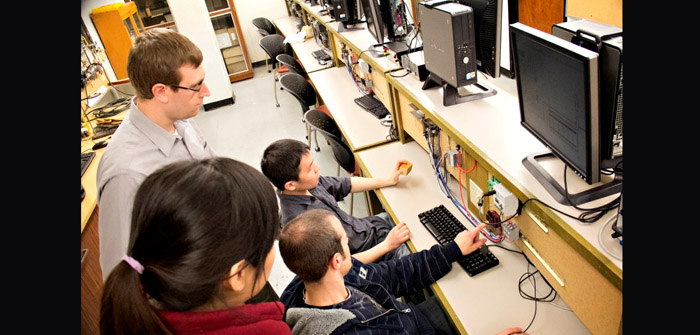(Photo | Courtesy of Oregon State University)
Karl Haapala of the Oregon State University College of Engineering has received a $1.8 million grant from the National Science Foundation (NSF) to help ensure that current and future workers in the manufacturing sector have access to high-quality engineering education and technical training.
Haapala and his team will design, develop and evaluate online courses in mechatronics, a multidisciplinary branch of engineering that includes both electronic and mechanical systems.
The goal is to create courses that give manufacturing workers access to the education they need to expand their skill sets and stay valuable, and help manufacturing employers fill openings with highly trained candidates.
“An aging workforce, increasingly automated systems and migration of employment opportunities to lower-cost labor markets have conspired against the modern worker, especially in product manufacturing,” said Haapala, associate professor of industrial and manufacturing engineering and the Tom and Carmen West Faculty Scholar in the College of Engineering. “Compounding these challenges is the criticism that our educational system is failing to produce graduates ready to work in 21st Century manufacturing, including mechatronics technologies.”
The NSF is funding the project through its EHR Core Research: Production Engineering Education and Research (PEER) program, supported by a $10 million gift from Boeing, which seeks to improve production engineering education and to study the effectiveness of new educational strategies. PEER awards are also going to the University of Southern California, Purdue University, Northeastern University and the Colorado School of Mines.
Co-principal investigators with Haapala include David Kim and Zhaoyan Fan of the College of Engineering, Christopher Sanchez of the OSU College of Liberal Arts and Michael Mattson of Clackamas Community College in Oregon City. Burak Sencer and Matthew Johnston of the OSU College of Engineering will play key roles in educational content development.
OSU will partner with several community colleges across Oregon and Washington, with Clackamas, Portland, Treasure Valley (in Ontario, Oregon) and Clark (in Vancouver, Washington) as initial partners. The project will also include regional industry partners as well as the Oregon Manufacturing Innovation Center in Scappoose and the Clean Energy Smart Manufacturing Innovation Institute in Los Angeles.
“This very important work will contribute to the national need for well-educated engineers and technicians in production engineering,” said Irem Tumer, interim vice president for research at OSU. “The project exemplifies the impact our manufacturing research has on the well-being of individual workers, the manufacturing sector and the entire economy.”
The overall goal of the project is to develop a set of online course modules that include in-person labs, said Sanchez, an associate professor of psychology who researches STEM learning.
“Each module will build competence in a specific mechatronics concept,” he said. “The hands-on labs will use a ‘lab-in-a-box’ approach that will give students the option of conducting labs at OSU or at a community college close to their home.”
The course modules will be organized into four groups that will enable students at two-year and four-year institutions, as well as working professionals, to earn mechatronics certifications.
“We’ll investigate how modular courses and remote labs influence student learning and success,” Haapala said. “Our findings will contribute to understanding best practices for delivering a high-quality online education that meets the professional goals of students as well as the needs of mechatronics and manufacturing industries. The aim is to make a strong mechatronics education more accessible to a wider range of students across the country, which will improve the preparation of current and prospective engineers and technicians.”
Demographic factors will be explored to determine for whom the proposed hybrid online approach works best, and student performance in remote labs will be compared to that of students in traditional labs.
“The research will provide greater insights into how different learners achieve success within the modularized curriculum,” Sanchez said.
Results will be made available through faculty training, conference presentations, publications and workshops.





